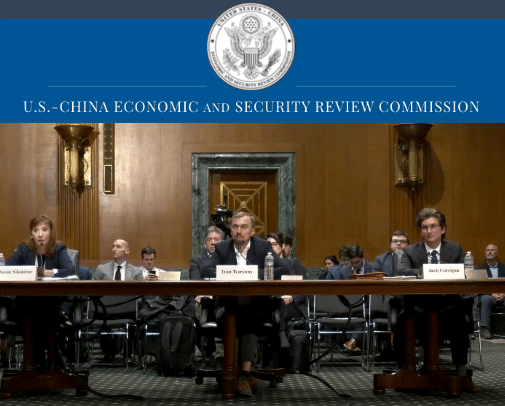February 1, 2024, The US Congress Commission’s hearing on “Current and Emerging Technologies in U.S.-China Economic and National Security Competition” invited Ivan Tsarynny, CEO and Co-founder of Feroot Security, to share his expert testimony before the U.S.-China Economic and Security Review Commission.

The hearing, focused on “Current and Emerging Technologies in U.S.-China Economic and National Security Competition,” held on February 1, 2024, provided a pivotal platform for discussing the intricate web of digital surveillance that challenges U.S. sovereignty and individual privacy.
Mr. Tsarynny shed light on the silent yet pervasive threat posed by tracking technologies and software-connected hardware under China’s jurisdiction, offering a sobering glimpse into how these tools are used to siphon sensitive U.S. data to entities including the Communist Party, Chinese Intelligence, and the People’s Liberation Army. His revelations underscored the paramount importance of safeguarding American data against foreign surveillance, particularly from China, a nation that has masterfully woven technology into the fabric of global espionage.
The Unseen Threat of Tracking Pixels
Feroot’s extensive research, analyzing over 3,500 websites, has unearthed alarming statistics: a significant portion of U.S. user data is being harvested by tracking pixels, notably those associated with ByteDance’s TikTok. These pixels, Tsarynny explained, collect vast amounts of data indiscriminately, posing a direct threat to national security by potentially making sensitive information accessible to Chinese authorities. This data collection mechanism operates silently, capturing everything from keystrokes to personal health information, without the knowledge or consent of U.S. citizens.

The Surveillance Capabilities of Software-Connected Hardware
Tsarynny also turned the Commission’s attention to the equally concerning surveillance potential of software-connected “smart” devices. These devices, ranging from TVs to refrigerators, can contain backdoors that enable covert access for remote surveillance. Illustrating this point, Tsarynny referenced instances where smart TVs and CCTV cameras were manipulated to send data and video feeds back to China, highlighting the pressing need for stringent security measures in the manufacturing and deployment of smart technology.
Toward a Secure Future: Policy Recommendations
The testimony concluded with Tsarynny presenting five strategic policy recommendations aimed at fortifying U.S. defenses against digital espionage:
- Establish Clear and Universal Rules: Implement unambiguous regulations that protect U.S. user data from foreign surveillance, ensuring they align with international privacy standards like the GDPR.
- Prohibit Data Transfer to Entities Under China’s Jurisdiction: Enforce strict bans on the sharing of U.S.-based user data with Chinese entities, safeguarding American privacy and security.
- Secure the Technology Supply Chain: Mandate comprehensive security measures throughout the technology supply chain to prevent data breaches at every stage.
- Ensure Corporate and Executive Accountability: Hold companies and their executives personally responsible for the misuse of U.S. data, similar to financial accountability under regulations like the Sarbanes–Oxley Act.
- Foster International Cooperation: Encourage global collaboration to establish a unified front against the misuse of technology for surveillance and espionage.
Tsarynny’s testimony before the Commission was not just a call to action—it was a blueprint for securing the digital frontier against the sophisticated surveillance machinery of China. As the U.S. grapples with the dual challenges of technological innovation and national security, the insights provided by Feroot Security’s CEO offer a critical pathway toward safeguarding American data and preserving the privacy rights of its citizens in an increasingly interconnected world.


